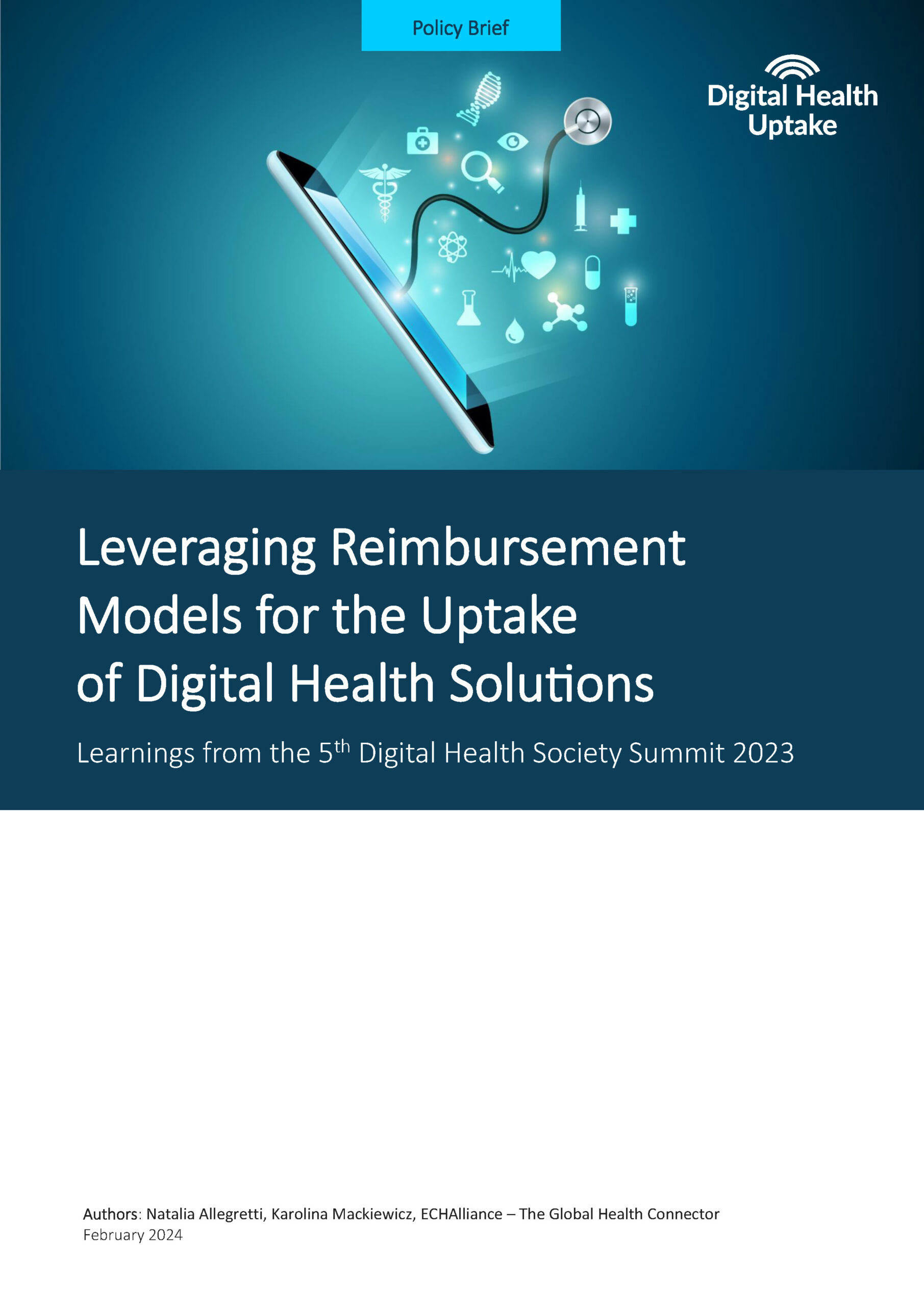Digital health technologies (DHTs), and in particular digital therapeutics (DTx), have the potential to enhance healthcare delivery, improving its quality, safety, and efficiency; however, a considerable number lack significant evidence to substantiate their effectiveness, frequently because of ambiguous or loosely defined reimbursement pathways that impede entry into national health systems. In addition, at the early stages of development, developers often lack clear guidance on the evidence required throughout the lifecycle of their innovation for assessing its efficacy and safety. Incorporating these technologies into national reimbursement frameworks not only provides significant financial support for embracin g innovation but also signals to technology users and decision makers that rigorous evaluation has taken place. Certain EU countries, like France and Germany, serve as noteworthy examples of funding practices for digital health solutions. They actively champion healthcare digitalisation and have established standardised reimbursement routes. In contrast, in other regions, these pathways are either in early development or lack clarity, resulting in fragmented markets that pose significant challenges for adop tion and expansion. Exploring existing examples of the “Fast Track” pathway for reimbursing digital health applications can provide insights into promoting more robust evidence generation and broader adoption of digital solutions.
Digital health technologies (DHTs), a range of digital tools designed to enhance healthcare delivery, have the potential to revolutionise healthcare delivery by streamlining operations, industry processes, improving patient outcomes and decreasing healthca re costs.
This statement is particularly more incisive when it comes to digital therapeutics (DTx), evidence based therapeutic interventions driven by software programs or digital technologies to prevent, manage, or treat a medical disorder or disease. These interventions are designed to deliver specific therapeutic content directly to patients and differ from general health and wellness apps by undergoing rigorous testing and validation, often in the form of clinical trials, to demonstrate their safety and efficacy.
Despite the proven success of DTx in treating various conditions, their widespread adoption faces several challenges within the highly fragmented landscape of the healthcare sector. Factors influencing the adoption of DTx within healthcare systems span from technological considerations and regulatory frameworks to patient engagement and healthcare provider acceptance.
When it comes to the regulatory framework, and specifically to the economic or financial dimension of healthcare, reimbursement decisions and appropriate financing schemes, which are Member States competence, are critical factors in making digitalisation happen across the EU healthcare systems.
The absence of specific reimbursement models and a lack in standardised assessments of health related technologies create difficulties in comparing the efficacy and cost effectiveness of digitally supported health interventions against conventional clinical methods, limiting market entry for innovative technologies.


Understanding the full spectrum of facilitators and uptake factors in this arena is essential to identify ways in which policy makers and providers can facilitate the adoption of effective DHT s within a healthcare system, as well as the steps developers can undertake to support products’ deployment.
The emphasis on employing reimbursement mechanisms as motivators for a thoughtful shift toward digitally enabled clinical pathways and data driven interventions, along with the encouragement through incentives to utilise technology for improving health system efficiency, was central to the Digital Health Uptake (DHU) Catalyst session held during the 5th Digital Health Society Summit (DHSS) (“Connecting the Dots for Sustainable Healthcare: Powered by Health Data & Digital”, virtual, 14 – 15 November 2023).
Referencing instances in Germany and France, such as the Digital Healthcare Act (DVG ), Digital Health Roadmap 2023 2027, the national authorities and suppliers representatives, invited speakers speakers (Louisa Stüwe Project director Digital health delegation at French Ministry of Health and Prevention, Kai Schnackenberg Deputy head of division for international affairs and innovation at Ministry of Social Affairs of the Free and Hanseatic City of Hamburg, Jens Nörtershäuser Notersoiser Founder & CEO at Kranus Health, Hendrik Steinert Head of Strategy & Business Development DTx at mementor by Resmed, Fabien Watrelot CEO at Ensweet) on the panel at DHSS 2023, provided an overview of reimbursement models already in use in their respective countries. They specifically presented the DiGA (Digital Health Applications) and the PECAN (Early Access to Reimbursement for Digital Devices) reimbursement pathways that provide rapid patients access to digital health solutions.
The recommendations and calls to action for national health systems stem from a discussion that touch base on existing successful practices and areas requiring procedural enhancements, while simultaneously examining the primary future plans of these pionee ring countries in establishing a value assessment framework and national reimbursement pathways.
Key insights gained from this enlightening sessionsession (The complete recording of the DHU Catalyst session “Leveraging Reimbursement Models for the Uptake of Digital Health Solutions” at the DHSS 2023 is vailable for access here), investigating the extent to which reimbursement models can facilitate the adoption of digital health solutions, include:
- Streamline reimbursement application processes;
- Advocate for the harmonisation of a European framework for requirements;
- Champion regulatory agility;
- Invest resources for large-scale clinical randomised trials;
- Prioritise the interoperability of data;
- Educate the market;
- Catalyse interdisciplinary collaboration and dialogue;
- Engage with “innovation ambassadors.”
Expanding on these key terms and delving further, the primary reasons underlying these messages are:
- Efforts to streamline the reimbursement application process to the greatest extent possible are poised to attract a greater number of suppliers. This strategy brings with it a host of advantages, including diminished administrative burden, accelerated time to market, cost-effectiveness, heightened predictability, improved market access, stimulation of innovation, and enhanced competitiveness within the industry. These combined factors serve to bolster manufacturers’ commitment to adhering more extensively to reimbursement procedures.
- Encouraging the adoption of a harmonised European framework for requirements stands to significantly advantage manufacturers. This initiative would simplify market entry, improve the reimbursement framework, and potentially pave the way for establishing a cohesive European health ecosystem. From a business standpoint, this effort could ultimately enhance the growth and competitiveness of the healthcare industry in Europe.
- Advocate for regulatory frameworks that are adaptable and responsive to the rapidly evolving landscape of digital health technologies can facilitate the timely approval and incorporation of innovative solutions while ensuring adherence to necessary safety and quality standards. A regulatory environment that encourages agility supports the growth of a dynamic and responsive digital health ecosystem.
- The importance of clinical evidence, specifically obtained through randomised controlled trials, serve the purpose of obtaining favourable reimbursement prices, as it assures payers and policymakers of the intervention’s efficacy and contributes to a more informed decision-making process. Within this framework a continuous focus on prioritising data interoperability and their secondary use should be maintained. Upon patients’ consent, manufacturers could gain access to extensive datasets generated in real-world settings. These datasets have the potential to function as a foundational evidence source for impact assessments, negating the necessity for traditional patient recruitment methods and reducing the financial investment required for generating clinical evidence. To ensure this, appropriate data governance is fundamental to realise the potential of health data in a trusted and secure way and the European Health Data Space (EHDS) can play a pivotal role.
- A robust digital health acceleration strategy should include training in digital health, not only in the curricula of healthcare professionals and allied workers but also in various other professional fields such as legal and IT. This is crucial considering the extensive interconnections within the healthcare sector. It is essential to ensure that training institutions have the capacity to establish or expand digital health literacy. Emphasis should be placed on ongoing education and accreditation to cultivate a workforce that is adept at navigating the evolving landscape of digital health, ultimately enhancing the effectiveness and integration of innovative technologies in healthcare practices.
- Forging strong connections and dialogue, including at the governmental level, with medical organisations is essential for the effective dissemination of evidence regarding the advantages offered by digital therapeutics to both healthcare professionals and patients. This approach accelerates the adoption of digital approaches, particularly among professionals who may lean toward traditional care. IT developers should be prepared to engage in collaboration with various stakeholders to ensure a comprehensive understanding and broad acceptance within the healthcare community.
- Digital health ambassadors are instrumental in creating a supportive and empowering environment for patients to embrace the transformative potential of digital health solutions. Their role as educators, advocates, and personalised guides contributes to the overall success of digital health adoption, fostering a more connected, informed, and empowered patient population.
Based on the discussion and conclusions, adopting reimbursement models to align with the digital era is crucial for the enduring integration of digital health solutions.
The implementation of those kinds of models, ideally following comprehensive consultations with all stakeholders across various sectors, is highly recommended in all public systems aspiring to leverage the digital health transformation.
DISCLAIMER
Views and opinions expressed are those of the author(s) only and do not necessarily reflect those of DG CONNECT, European Commission. Neither the European Union nor the granting authority can be held responsible for them.
